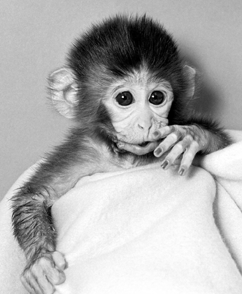 I read a study a few years ago, in Scientific American, in which researchers showed that chimpanzees and capuchin monkeys felt cheated when they saw someone else get a reward for something they did not actually earn, or when they themselves did not get a reward for something they did earn, while others did get the reward.
I read a study a few years ago, in Scientific American, in which researchers showed that chimpanzees and capuchin monkeys felt cheated when they saw someone else get a reward for something they did not actually earn, or when they themselves did not get a reward for something they did earn, while others did get the reward.Although this was something newly discovered, I did not find it that surprising, since it is predicted by Evolutionary Psychology's hypothesis of cheating detection, and because by now I'm used to expecting monkey and ape behavior to be similar to ours... or ours to theirs, to be a bit more precise. I even pride myself in being a monkey of sorts... I own a wonderful coffee table book called My Family Album, by Frans de Waal, which shows photographs of primates both looking and behaving strikingly similarly to people. Many of the photographs are actually so good that you can't help feeling that the primates have a great degree of humanity, and it really makes you wonder whether they resemble us or the other way around...
The first implication I recognized from this discovery was concerning human moral sentiments: in this respect I am a faithful student of David Hume's moral skepticism and his skeptical solutions to epistemic problems: naturalistic explanations. Part of his genius, I believe, lies in his uncanny ability to see beyond some of the most deeply entrenched instincts and presumptions informing our complete set of experiences and beliefs about the world.
Hume, rather than ask why something is moral/immoral, as most people would be inclined to inquire, would ask why we believe something is moral or immoral, and this is what causes me to admire him as much as I do: instead of concentrating on the metaphysics of morality, and the reality/falsity of moral claims, he concentrates on the subject making such claims and holding such beliefs. Hume turns metaphysics into epistemology and philosophy of mind, a feat for which I believe he does not get enough credit to this day.
The main question for Hume is: how does the mind work so as to acquire and hold the beliefs and experiences it has? And he realizes that such beliefs need not correspond to any actual referents holding real existence. In other words, Hume believes that there is something about the human mind responsible for the beliefs one has; and this 'something' is not necessarily the existence of certain truths in some inaccessible realm, or even our rational capacity, as he demonstrates with many clever and astute arguments.
When I teach I try to emulate Hume's approach: most students won't show interest in a class in which they cannot relate or in which they have no personal stake, so when I ask them to defend their most natural and unquestioned inclinations, and they find themselves unable to do so, they really do get involved because they need to justify their beliefs to themselves.
But I digress... So, to get back to monkey business, the article in Scientific American provided empirical support for Hume's claims that morality is based on sentiments, on feelings. The monkeys had a "sense" of injustice, a feeling that caused them to behave angrily against cheaters, even though they could not actually articulate this sense, just like people are unable to articulate most of their moral prejudices, and for the very same reasons: our sense of morality is based on the evolution of our mind, and nature did not see it as a necessary requirement that we be aware of all our presuppositions, only that we have them.
I recently read an article in the Freakonomics column (which I must embarassingly admit not knowing existed till about a week or two ago), that provides even more support for Hume's views and for evolutionary psychology: capuchin monkeys can learn to use money, and when they do they behave strikingly similarly to humans, making the same kinds of rational and irrational choices, which again raises the question of who resembles who.
Although sex is always a fascinating subject to talk about, Levitt and Dubner were careful not to make too much out of the fact that Chen (the researcher in charge of these studies) witnessed "the first observed exchange of money for sex in the history of monkeykind," when a male monkey basically paid a willing female for an amorous session of monkey love making.
This opens up a great and interesting can of worms, doesn't it?
No comments:
Post a Comment